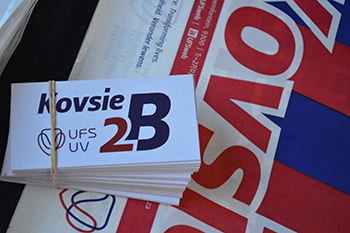

Learners from Molapo Secondary School in
Makoane, Qwaqwa, during Open Day.
Photo: Thabo Kessah
AMAZING! This is just one of the words used by prospective Kovsies to describe their experience, when thousands of learners visited the Qwaqwa Campus for this year’s Open Day on Saturday 20 May 2017.
“Spending time on campus and learning what the university offers even beyond academics was such an amazing experience,” said a prospective Political Studies and Governance student, Kamohelo Mofokeng from Bluegumbosch Secondary School in Qwaqwa.
“We explored both academic and support services, and getting to see and listen to motivating words from eTV stars was unforgettable,” she added. “The event was informative and many of our learners even managed to apply online using university facilities,” said Modiehi Masita, Life Orientation teacher at Tsebo Secondary School in Boiketlo, Qwaqwa.
First step in the right direction
Talking to learners, Campus Principal Prof Prakash Naidoo said their visit was the first step in the right direction.
“This is the first step towards attaining your dream qualification. You have to work hard to build yourself a career, and not aspire to be what is commonly known as a tenderpreneur,” he said. “You have come to this campus when men need to stand up and not bury their heads in the sand, as we are faced with abuse and killings of women and children. We must all stand up to abuse,” he said under resounding appreciation from learners and their teachers.
Also talking to the learners were TV stars from eTv’s Rhythm City and Scandal.
I can and I will make it
‘I can and I will make it’ led by Mapula Mafole was adopted as the war cry towards the examinations and success in life for the class of 2017. Mafole plays the role of Mapula in the TV series Rhythm City. She was accompanied by Ishmael Sango and Nkosi Cengane, who respectively play Sabelo and Emmanuel in Rhythm City, and Mbulelo Katise who plays Scelo in Scandal.
Qwaqwa Campus alumnus and hip-hop artist, TactixSA, provided entertainment.